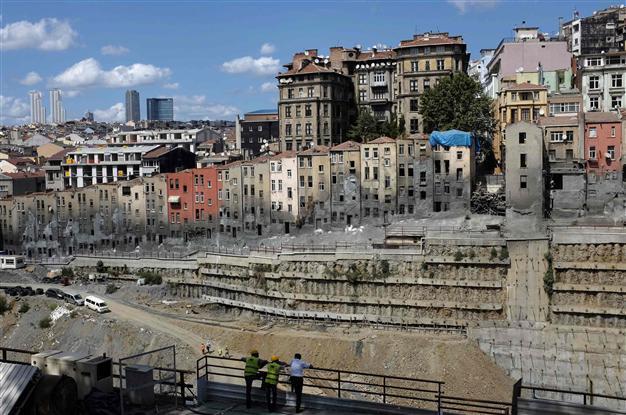Gentrification tears at Istanbul’s historically diverse fabric
ISTANBUL – Reuters

Workers, with emptied old buildings in the background, pause at a construction site in the Tarlabaşı neighborhood of Beyoğlu, central Istanbul. REUTERS Photo / Murad Sezer
Business is brisk at Ilya Avramoğlu’s 78-year-old shop, one of the last owned by a non-Muslim on Istanbul’s historic İstiklal avenue, but a new regulation pushing gentrification may soon force its closure.
Run by three generations of a Jewish family and little changed since the 1930s, the wood-paneled Kelebek Corset Shop survived a mob attack nearly 60 years ago and decades of economic decline by keeping up with what women wear underneath.
Avramoğlu has even appealed for help from Pope Francis, who is due next month to visit the city.
An amendment to commercial laws that took effect in July allows landlords to eject tenants of 10 years or more without cause, which could hit countless businesses and residents.
The rule does not target non-Muslim minorities such as Jews, Armenians and Greeks. However, members of these communities are among Istanbul’s oldest tradesmen and are often long-term tenants, putting them at risk of eviction.
“Over the years, we watched other minorities close shop one by one,” said Avramoğlu, 53, who began working at the store when he was 18 and took it over when his father Borya became too frail in 2007.
“We have always been determined to stay, but now our fate isn’t in our hands. This law is our death sentence.”
Avramoğlu’s shop belongs to a local Catholic church whose congregation is much diminished and in need of money.
“We need laws to preserve the historical fabric of Istanbul, but the aim now is driven by profit. History gets in the way,” said Mehmet Tanal, a lawyer and lawmaker in the opposition Republican People’s Party (CHP), who said many fellow members of Parliament are landlords with ties to the real estate business.
He has submitted a bill to revoke the 10-year rental clause.
Kelebek’s windows pay homage to a bygone era, displaying lingerie such as “bullet bras” favored by 1950s starlets.
Millions of people a week flock to İstiklal, making it one of Istanbul’s hottest retail districts, and commercial rents have tripled in dollar terms in the past 10 years.
Unlike some other European cities, the municipality has lax zoning rules for determining usage of space that do not balance cultural and commercial interests, said Akif Burak Atlar, secretary of the Chamber of Urban Planners in Istanbul.
The Beyoğlu mayor’s office did not respond to a Reuters request for comment.
“The store is part of our cultural heritage being swept away in a gentrification project,” said Elvan Kıvılcım of the Beyoğlu City Defense, which organized a march against the eviction.
More than 2,000 supporters have signed Avramoğlu’s online petition asking Pope Francis to intervene and keep Kelebek Corset at its historic Santa Maria spot. An official at the Vatican Embassy declined to comment.
Apoyevmatini, Istanbul’s last Greek-language daily newspaper, abandoned its offices in an İstiklal arcade above its historic printing press this month after 89 years due to financial difficulties.
In September, the 120-year-old Pando’s Creamery in the nearby Besiktaş neighborhood served its last dish of honey and cream made from water-buffalo milk.
